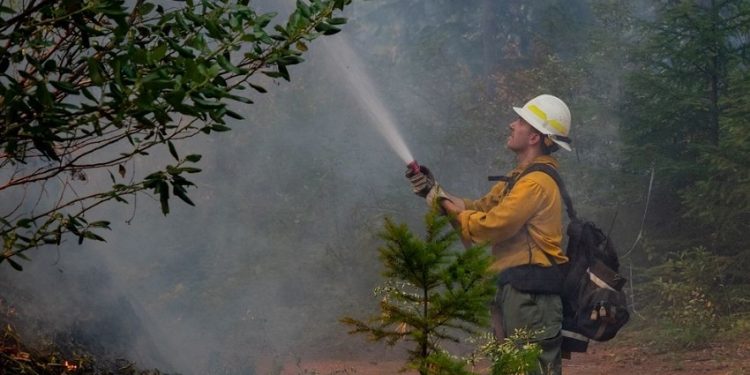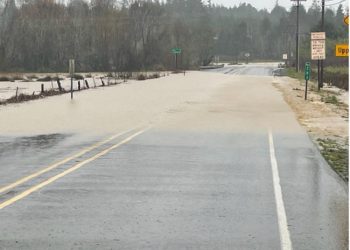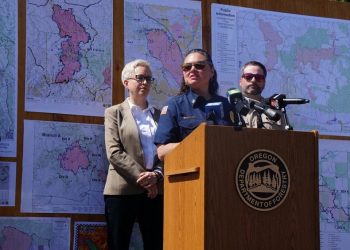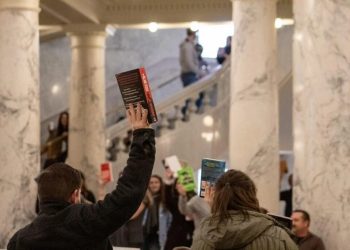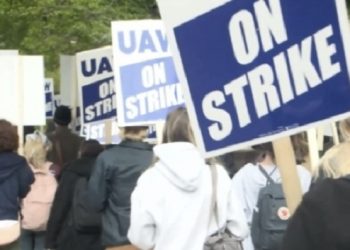Astoria, OR – Oregon’s Democratic U.S. Senators, Ron Wyden and Jeff Merkley, joined a group of over a dozen colleagues on Tuesday in sending a letter to the Trump administration, urging that seasonal firefighters be exempted from the federal hiring freeze implemented by President Donald Trump.
Shortly after assuming office last month, Trump signed an executive order instituting a hiring freeze as part of his broader effort to reduce the size of the federal government. The order applies to most federal agencies but makes exceptions for military, immigration enforcement, and public safety positions. However, wildland firefighters were not specifically mentioned in the order, prompting concern among lawmakers, particularly those representing states vulnerable to wildfires.
In their letter, initiated by Senator Jacky Rosen of Nevada, the group of Senators expressed alarm over reports indicating that seasonal firefighter hiring had been halted due to the freeze. “The Administration must not sacrifice the safety of the American people for the benefit of implementing a political agenda,” the senators wrote, urging the administration to reverse its stance and resume hiring seasonal firefighters immediately.
The letter, signed by all Senate Democrats and independent Senators Bernie Sanders of Vermont and Angus King of Maine, emphasized the critical role these firefighters play in protecting communities and public lands from wildfires, especially as fire seasons grow longer and more intense. The letter specifically raised concerns about the hiring freeze’s impact on agencies such as the U.S. Forest Service, Bureau of Land Management, and National Park Service, which rely on seasonal workers during peak wildfire seasons.
The senators addressed the letter to leaders of the U.S. Department of the Interior, the U.S. Office of Personnel Management (OPM), and the U.S. Department of Agriculture (USDA). Their concerns stemmed from reports suggesting that, despite the administration’s general exemption of public safety positions, the freeze could still be affecting firefighter hiring across various federal agencies.
In response, OPM confirmed that seasonal firefighters are, in fact, exempt from the hiring freeze. A spokesperson for OPM referred to a January 20 memorandum that outlines exceptions, which includes seasonal employees necessary to meet recurring seasonal workloads. Additionally, the Forest Service, part of the USDA, indicated that wildland firefighters fall under public safety positions, and the department is working with OPM to ensure staffing needs are met.
Senator Wyden, however, expressed skepticism about the clarity of the situation. In an email, he noted that while the OPM’s statement was reassuring, he remained concerned given the confusion surrounding the administration’s early actions. “I’d like to see verifiable evidence of this claim, such as the actual hiring of a seasonal firefighter in Oregon or anywhere else in America,” Wyden said.
The Department of the Interior also reiterated that it is focused on hiring key personnel to safeguard public lands, infrastructure, and communities from the growing threat of wildfires. In particular, the department emphasized its commitment to filling positions to ensure the public can access national parks during peak seasons.
Despite these assurances, the senators highlighted the alarming rise in wildfires in recent years. With more than 64,800 wildfires in 2024—an increase from 56,500 in 2023—and almost nine million acres burned, the senators argued that these troubling trends further underscored the urgency of staffing wildfire response efforts.
“The increase in wildfires across the nation underscores the critical need for a robust, well-equipped firefighting force,” the senators wrote. “The safety of our communities depends on swift action to ensure the timely hiring of these essential workers.”
As the Trump administration navigates the complexities of its hiring freeze, the letter serves as a reminder of the vital role seasonal firefighters play in managing wildfire risks, safeguarding communities, and protecting public lands across the United States.

